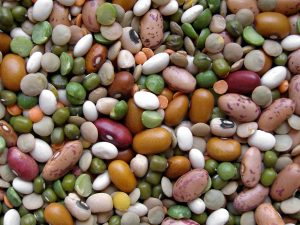 Heard a great story about fiber on NPR this morning, all about how food manufacturers add fiber to things like sugary cereals and white bread so they can make claims about fiber and health on the packaging.
Heard a great story about fiber on NPR this morning, all about how food manufacturers add fiber to things like sugary cereals and white bread so they can make claims about fiber and health on the packaging.
We’re pleased that the story makes the point that foods that are naturally high in fiber — vegetables and fruits, whole grains and beans — are better options, but then we heard something that brought us up short:
So are these fiber-fortified foods actually making you healthier? This question turns out to be one of those places where scientists know a lot less than you may think they do. For example, a lot of people think that fiber will help protect you against colon cancer. But so far, that link is not conclusive.
In this case, it’s “a lot of people” who are right, and NPR who’s … well, not wrong, exactly, but imprecise.
Because the evidence that diets high in fiber can and do protect against colorectal cancer is not only strong, it’s just gotten stronger. And with February being Cancer Prevention Month, it’s a good opportunity to remind people of the hard science showing that they can protect themselves from colorectal cancer.
In 2007, the AICR/WCRF Expert Report looked at thousands of studies on all aspects of diet and cancer risk, and concluded that the evidence supporting a link between dietary fiber and lower colorectal cancer risk was strong enough to earn a grade of “probable.”
But just last year, as part of the Continuous Update Project, an AICR/WCRF expert panel again analyzed the collected evidence on colorectal cancer — including studies that appeared in the scientific literature after our 2007 report was published — and upgraded their judgment of the link from probable to convincing.
That evidence comes from a combination of study types — and some in the media feel that only randomized clinical trials (RCTs) can demonstrate that a given link is “conclusive.”
That’s true for cancer treatment, but not cancer prevention. Cancer can take decades to form, so scientists need to study it in different ways, using different study types. RCTs are included in AICR/WCRF’s Continuous Update, but so are cohort studies, case-control studies and other methods. Evidence from laboratory investigations is also factored in.
Bottom line: The evidence that dietary fiber protects against colorectal is now convincing, according to the largest, most comprehensive evaluation of the global scientific literature.
That evaluation is ongoing — that’s why its called the “Continuous” Update Project — and you can look to AICR to provide evidence-based assessments of the diet-cancer link as new evidence comes in.





